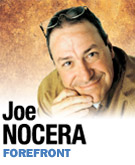Subscriber Benefit
As a subscriber you can listen to articles at work, in the car, or while you work out. Subscribe Now
 It was early in the evening of Jan. 13 when Ryan Boatright, the freshman basketball player at the University of Connecticut, learned that he was being suspended from the team for the second time this season.
It was early in the evening of Jan. 13 when Ryan Boatright, the freshman basketball player at the University of Connecticut, learned that he was being suspended from the team for the second time this season.
Earlier that day, he had flown into South Bend, Ind., with his teammates for a game against Notre Dame. The 19-year-old point guard was excited because some 400 people from his hometown, Aurora, Ill., were coming to see him play.
When his coach, Jim Calhoun, broke the news that the NCAA was still investigating him, Boatright collapsed in Calhoun’s arms. In tears, he called his mother, Tanesha, who began weeping uncontrollably.
It was her acceptance of plane tickets more than a year ago that had caused his first suspension. The NCAA had ruled the tickets an “improper benefit,” and had ordered him to sit out six games and pay a $100-per-month fine to repay the tickets. What more, she wondered, could the NCAA want?
A lot, it turned out. Tanesha is a single mother raising four children on a small salary. The NCAA investigators viewed her circumstances as a cause for suspicion, not sympathy. For instance, she owns a car. Where did she get the money to pay for it, they asked? How did she pay for her home? And so on.
Concluding that she had no choice but to cooperate— otherwise, her son would surely pay a severe price— Tanesha turned over her bank statements, as the NCAA demanded. Four NCAA investigators pored through her financial records and conducted interrogations in Aurora, seeking “evidence” that she was getting money from “improper” sources. (Tanesha declined to comment.)
When the investigators saw a series of cash deposits in her bank account, they demanded to know the source of the money. She told them: Friends had given her money so that she and her children could have a joyful Christmas. The investigators said they didn’t believe her; they felt sure that she must have gotten the money from an unscrupulous sports agent or some other party outlawed by the NCAA.
Meanwhile, her son remains in limbo, unable to play the game he loves, his reputation unfairly besmirched, while he awaits the NCAA’s latest ruling. People associated with Connecticut basketball, including Calhoun, are said to be furious at the NCAA’s treatment of Ryan Boatright. But the university is as fearful of the NCAA as Tanesha. It has yet to say a single word publicly on his behalf.
When I asked the NCAA about the Boatright case, the response I received was deeply disingenuous.
Refusing to discuss the actions of its investigators, it essentially said that Connecticut, not the NCAA, declared Boatright ineligible. That is technically true. Schools declare athletes ineligible because if they don’t, the NCAA will deprive them of scholarships, force them to forfeit games and prevent them from playing in postseason games.
Most astonishing, an NCAA spokeswoman told me that the organization does not have the legal authority to compel cooperation from parents. Again, technically true: Its real weapon—the threat of destroying their sons’ careers—is far more potent than any mere subpoena.
One question keeps reverberating in my head: How can this be happening in America? How can children be punished for the deeds of their parents— deeds that aren’t even wrong in any basic legal sense?
How can the NCAA blithely wreck careers without regard to due process or common fairness? How can it act so ruthlessly to enforce rules that are so petty? Why won’t anybody stand up to these outrageous violations of American values and American justice?
“The NCAA is like the Gestapo,” one parent wrote me in an e-mail. “It’s out there, we all fear it, and it is all-powerful and follows its own rules and makes them up as they go along. Who are they protecting? The same thing the Gestapo protected: themselves.”•
__________
Nocera is a New York Times columnist. Send comments on this column to [email protected].
Please enable JavaScript to view this content.
